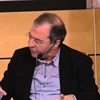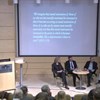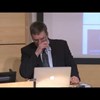limitation
Learning by Imitation in Games: Theory, Field and Lab
Erik Mohlin, Oxford University We exploit a unique opportunity to study how a large population of players in the field learn to play a novel game which has a complicated and non-intuitive mixed strateg

Forensic Art and Documentary Film as Non-Governmental Rights Campaigns: Possibilities and Limitations
This project consists of three research-initiation workshops on aspects of a unifying theme: forensics in art and documentary film.

Writing and stylistics
Writing and stylistics, "Text och stil", is an initiative offered to researchers in Sweden, which offers workshops and classes in more creative academic writing.
Stefan Arora-Jonsson: What Competition Brings
Stefan Arora-Jonsson, Professor at the Department of Business Studies, Uppsala universitet ABSTRACTCompetition is a ubiquitous feature of modern society, perhaps more so now than ever before. While com

Panel discussion - The Future of Humans. Moral Bioenhancement
The greatest problems of the 21st century - climate change, terrorism, poverty and global inequality, among others – are not the result of external threat, but predominantly the result of human cho

Q&A - The Future of Humans. Moral Bioenhancement
The greatest problems of the 21st century - climate change, terrorism, poverty and global inequality, among others – are not the result of external threat, but predominantly the result of human cho

Åsa Wikforss - The Future of Humans. Moral Bioenhancement
www.iffs.se Professor of Theoretical Philosophy at Stockholm University. She is currently working with the research project Knowing One’s Own Thoughts. The greatest problems of the 21st centur
The refinement paradox and cumulative cultural evolution: Complex products of collective improvement favor conformist outcomes, blind copying, and hyper-credulity
PLOS Computational Biology Abstract Social learning is common in nature, yet cumulative culture (where knowledge and technology increase in complexity and diversity over time) appears restricted to huma

Julian Savulescu - The Future of Humans. Moral Bioenhancement
www.iffs.se Uehiro Professor of Practical Ethics at the University of Oxford. His areas of research include the ethics of genetics, research ethics, medical ethics, sports ethics and the analy

Alexandros Rigos
I am a researcher at the Institute for Futures Studies in Stockholm and also affiliated with the Department of Economics at Lund University. My research interests are in economic theory and experimenta I hold a BSc in Physics (University of Athens) and an MSc in Economics (University of Birmingham). I obtained my PhD in Economics from the University of Leicester in 2016, after which I spent four years at Lund University as a postdoc. In 2020, I joined IFFS, where I work on the project , together with Erik Mohlin. You can find more information about me and my research at my website .








